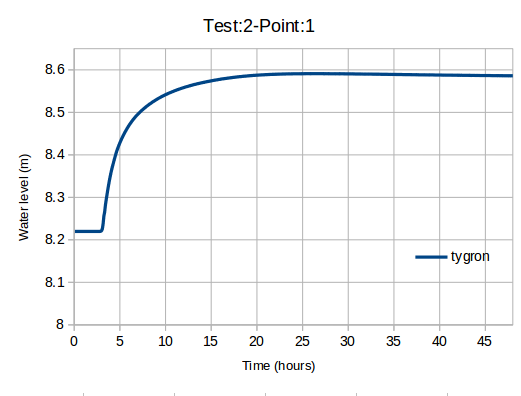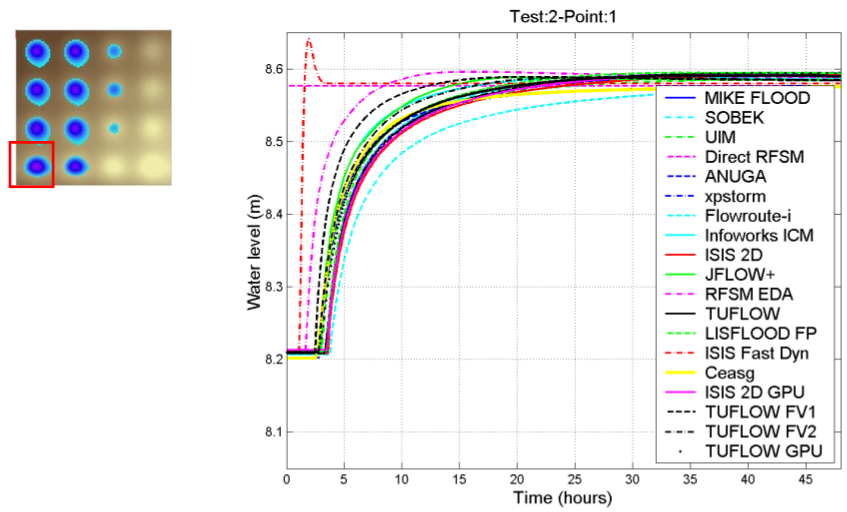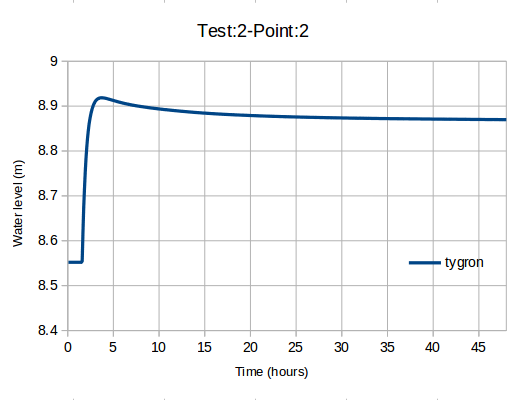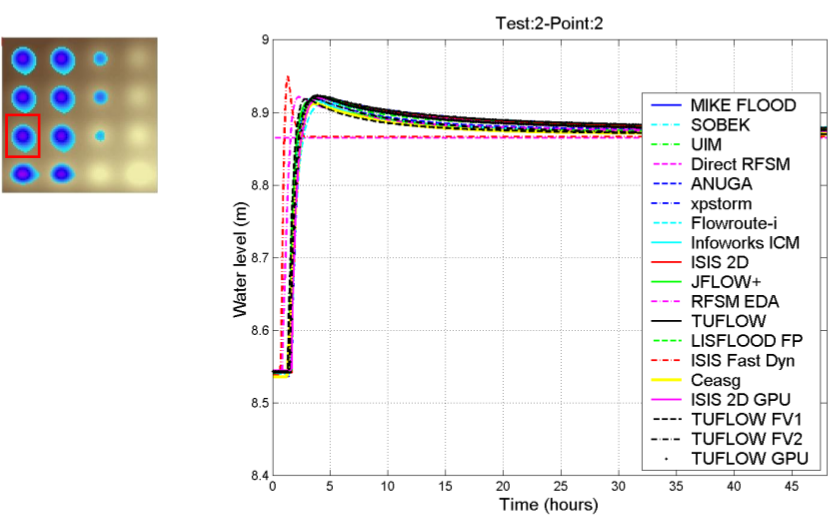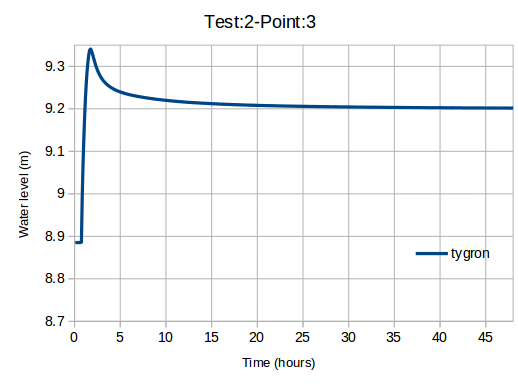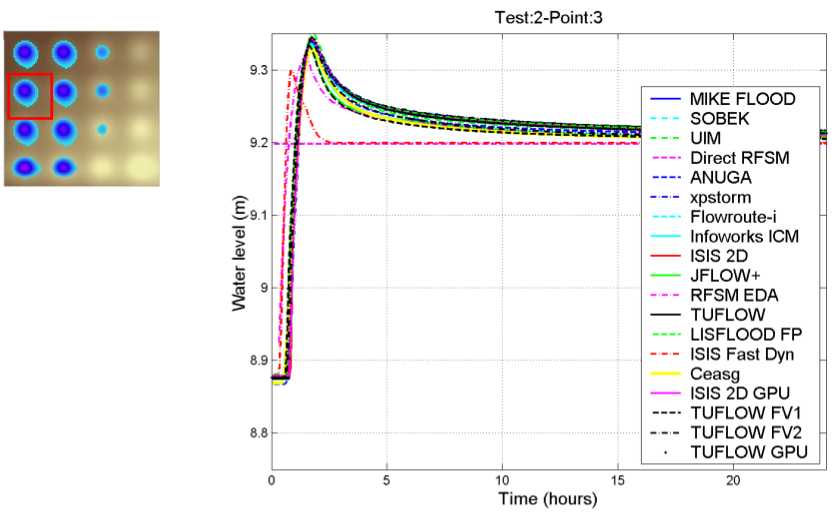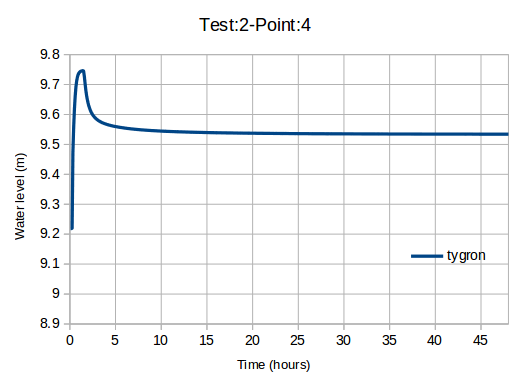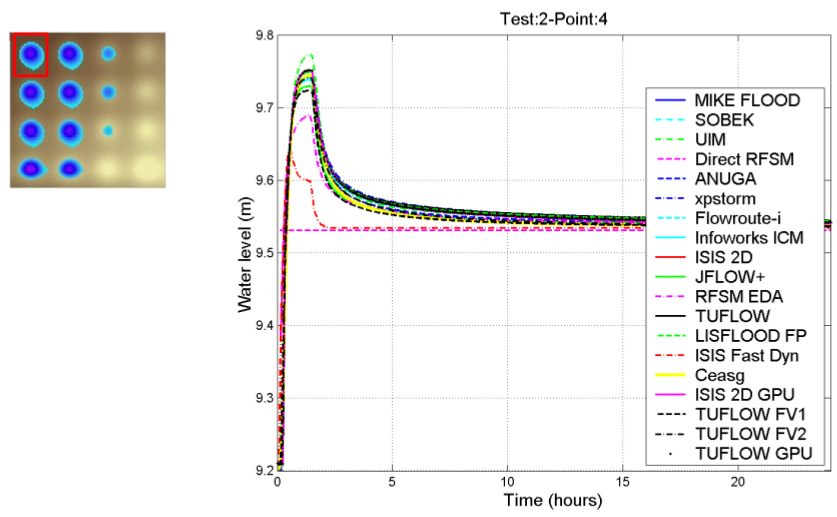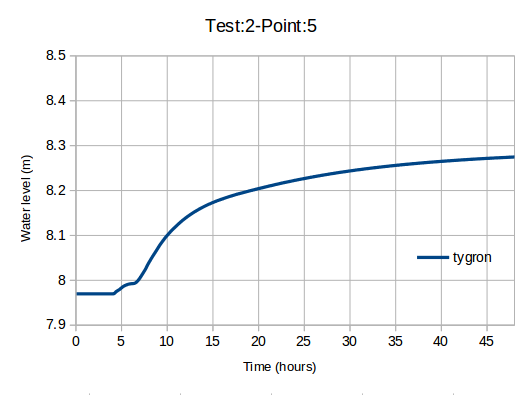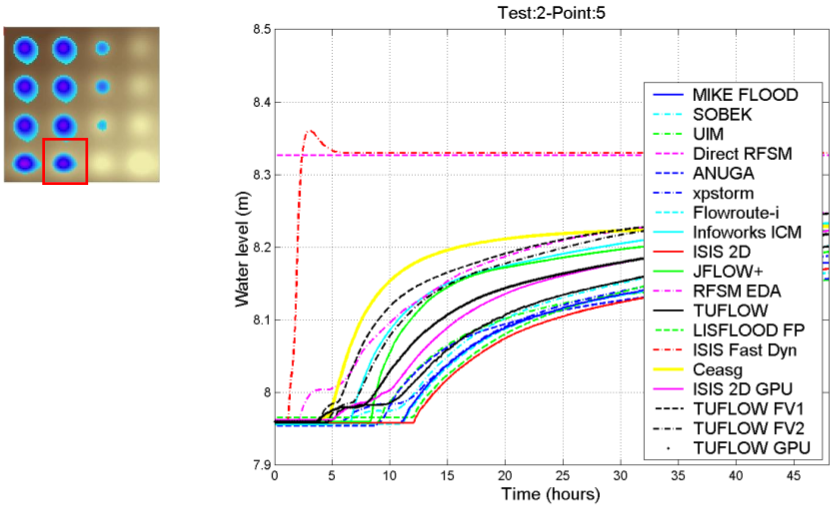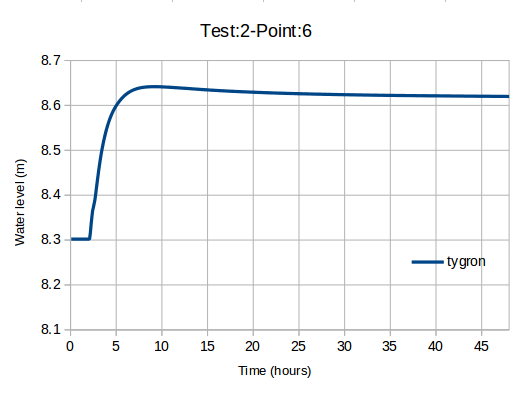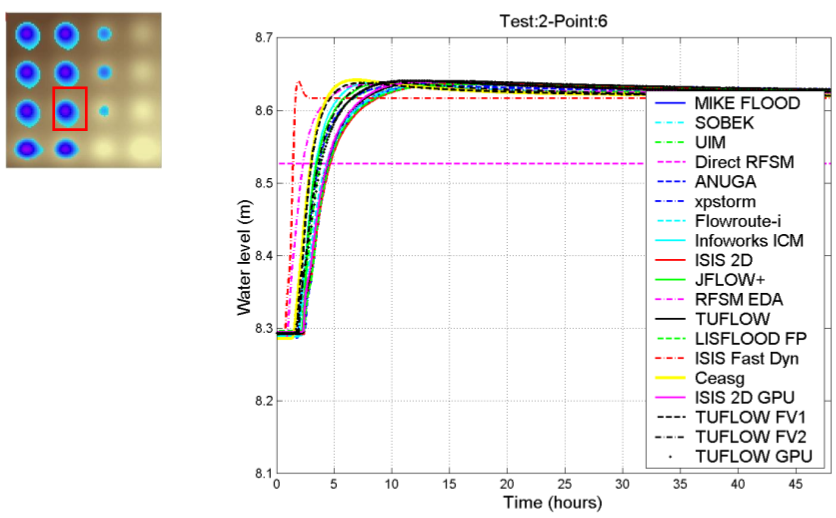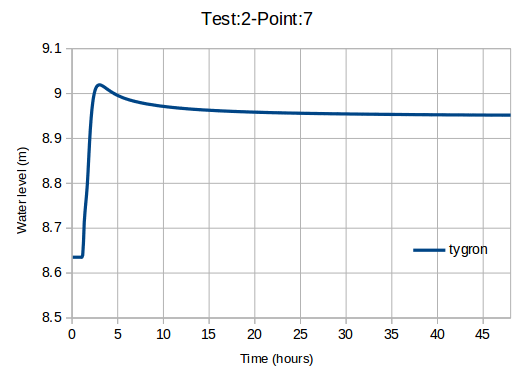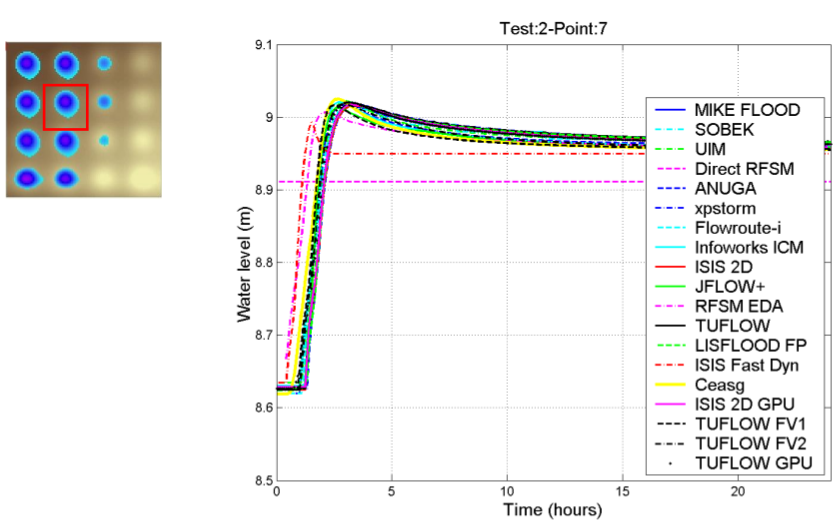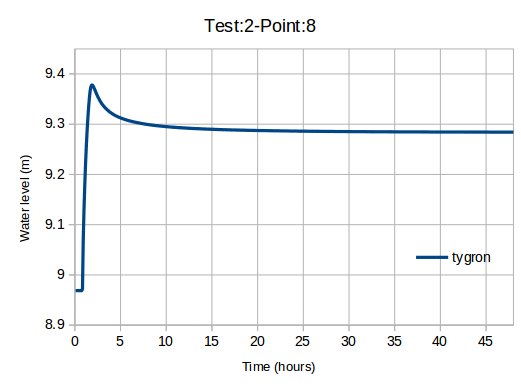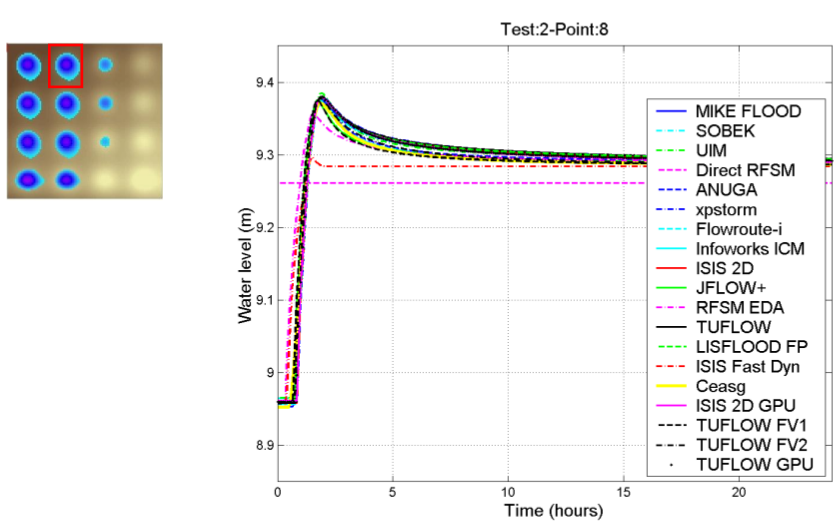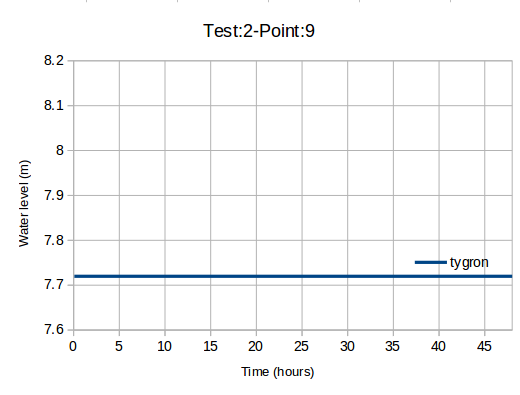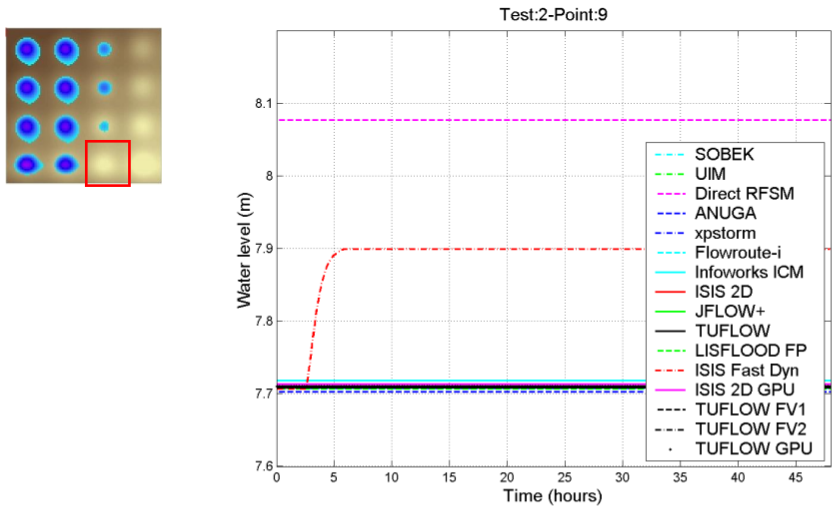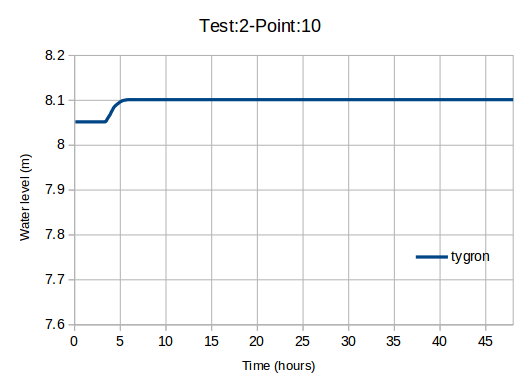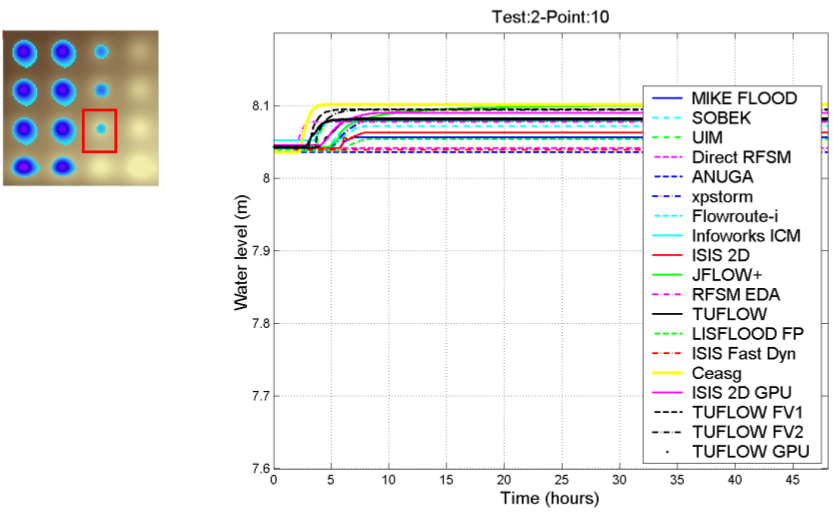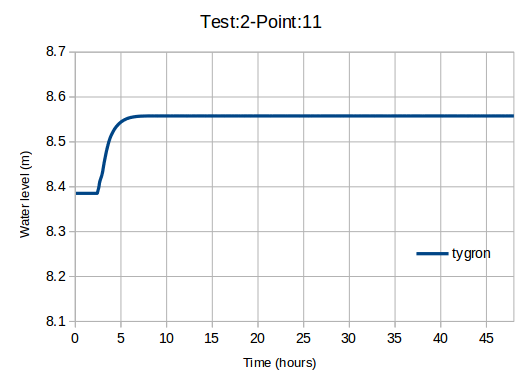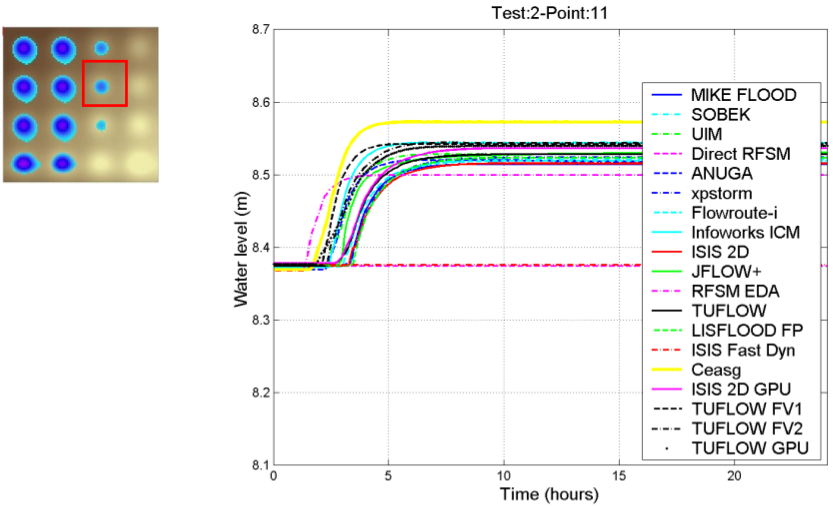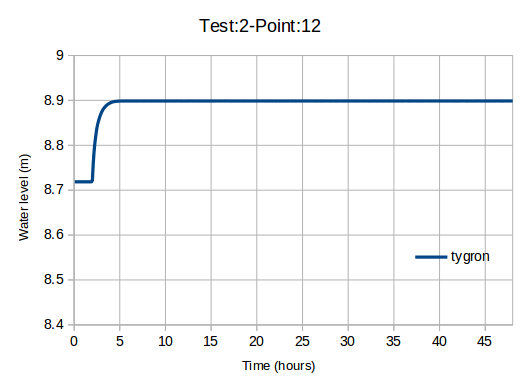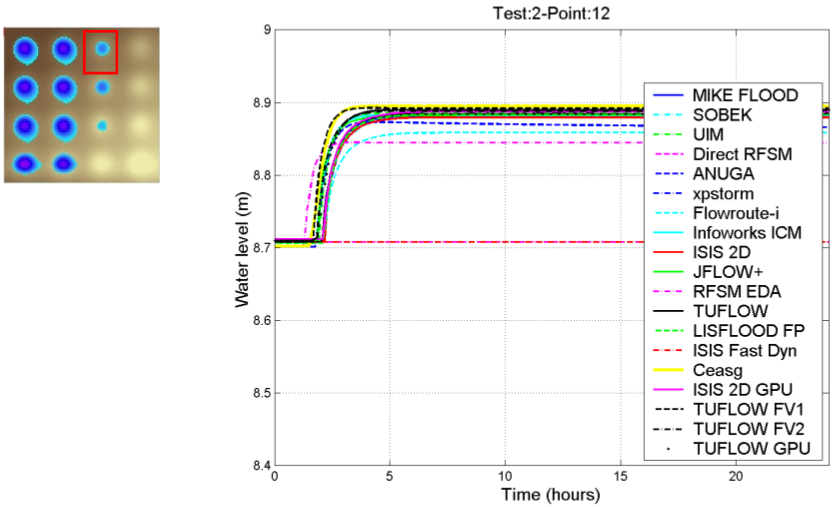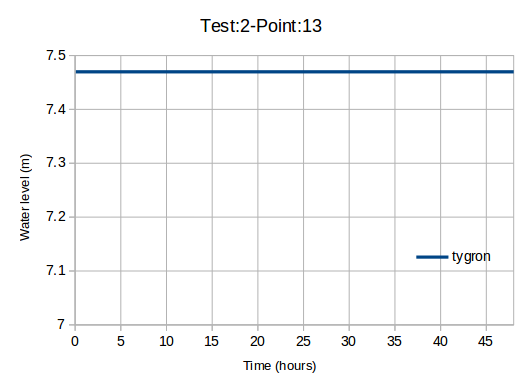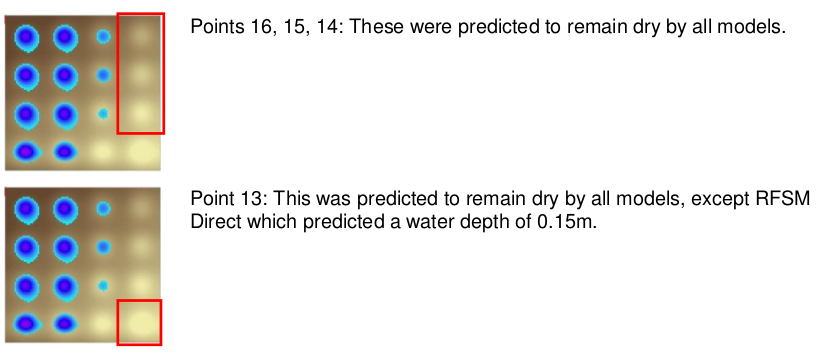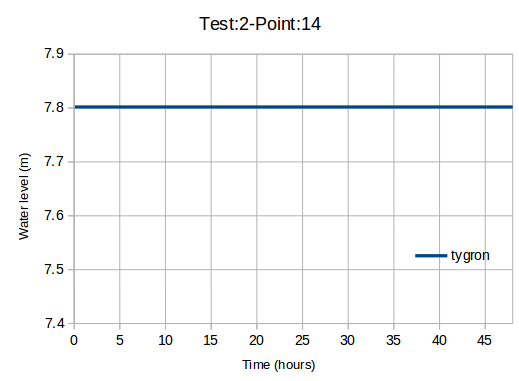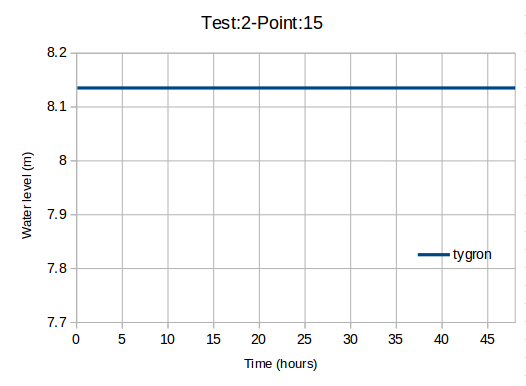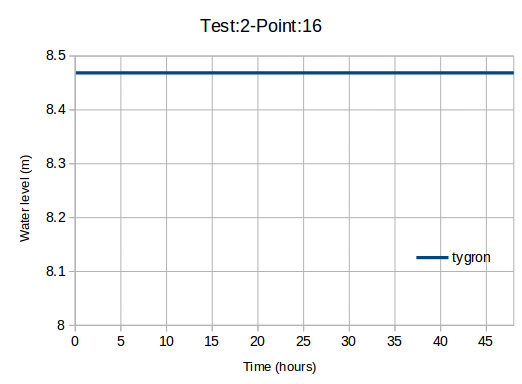UK EA benchmark 2 (Water Module): Difference between revisions
| Line 44: | Line 44: | ||
===Stats=== | ===Stats=== | ||
* Software package used: {{software}} | * Software package used: {{software}} | ||
* Numerical scheme: FV (Kurganov, Bollerman, Horvath) | * Numerical scheme: [[Surface flow formula (Water Overlay)|FV (Kurganov, Bollerman, Horvath)]] | ||
* Specification of hardware used to undertake the simulation: | * Specification of hardware used to undertake the simulation: | ||
** Processor: Intel Xeon @2.10GHz x 8 | ** Processor: Intel Xeon @2.10GHz x 8 | ||
Revision as of 10:00, 3 May 2019
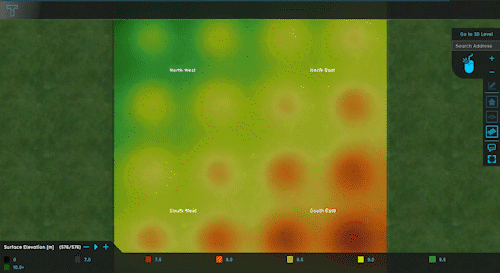
This page reports on the performance of the Tygron Platform's Water Module by means of the UK EA Benchmark Test 2 – Filling of Floodplain Depressions.
The test has been designed to evaluate the capability of a package to determine inundation extent and final flood depth, in a case involving low momentum flow over a complex topography.[1]
Description
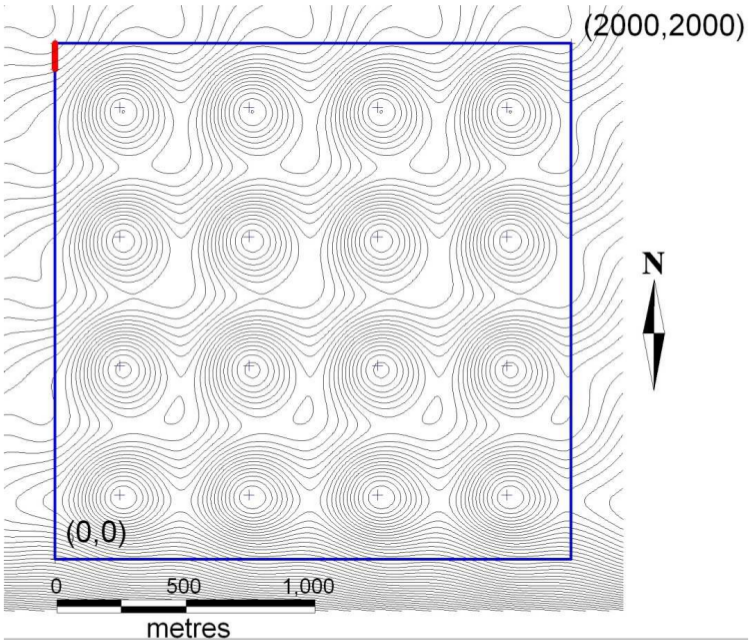
The area modelled, shown in Fig. (a), is a perfect 2,000 m x 2,000 m square and consists of a 4 x 4 matrix of ~0.5-m deep depressions with smooth topographic transitions. The DEM (digital elevation model) was obtained by multiplying sinusoids in the north to south and west to east directions, and the resulting depressions are all identical in shape. An underlying average slope of 1:1,500 exists in the north to south direction, and of 1:3,000 in the west to east direction, with a ~2-m drop in elevation along the north-west to south-east diagonal.[1]
The inflow boundary condition was applied along a 100-m line running south from the northwestern corner of the modelled domain, indicated by a red line in Fig. (a). A flooding with a peak flow of 20 m3/s and time base of ~85 minutes was implemented according the hydrograph in Fig. (b). The model was run for 2 days (48 hours) to allow the inundation to settle to its final state.[1]
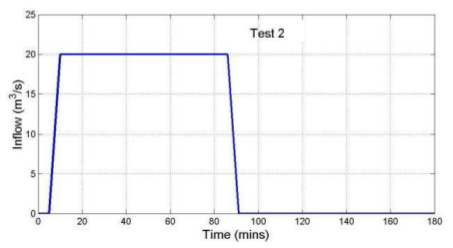
Initial and boundary conditions
- Initial condition: dry bed
- Inflow along the red line in Fig. (a)
- All other boundaries are closed
Parameter values
- Manning’s n: 0.03 (uniform)
- Model grid resolution (m): 20 m (or ~10,000 nodes in the area modelled)
- Simulated time (h): 48
Technical setup
The required DEM is provided as an ASCII file (test2DEM.asc). As its cell size is 2 m, whereas the test is expected to be run on a 20-m grid, it will be automatically rescaled by the grid rasterizer. The dimensions of the test area must be 2,000 by 2,000 m. The original DEM had an offset of -200 m, which was cropped down to -20 m (= 1 grid cell) so it could function as border cell. The rescaled and cropped ASCII file will shortly be provided as part of a .zip found at the bottom of this page.

Original 2-m heightmap (2,400 m x 2,400 m) 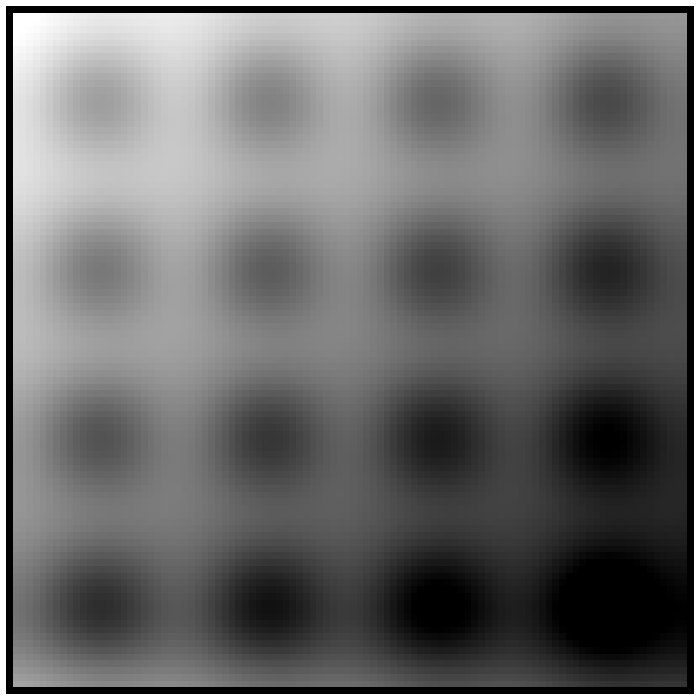
Cropped and rescaled to 20-m grid (2040 m x 2040 m). The black perimeter designates the border cells. 
Inlet series in the upper left corner.
In order to regulate the water level according to the water-level graph, the following setup was used: Inlet objects were placed on single grid cells with a constant value for x = 1 and y varying from 1 to 5, yielding a total of 5 points. The inlets were configured as follows:
- External area (m2): 1,000,000,000
- Water level (m): 1
- Threshold (m): none
- Inlet Q (m3/s) : 20 in total, thus 4 per inlet
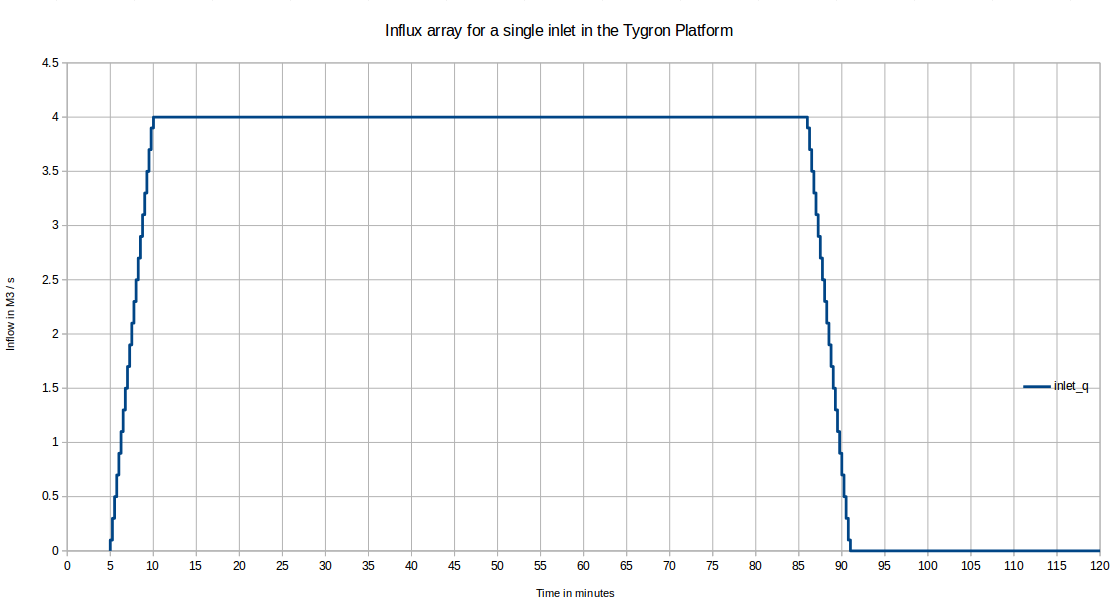
Output as required
Stats
- Software package used: Tygron Platform
- Numerical scheme: FV (Kurganov, Bollerman, Horvath)
- Specification of hardware used to undertake the simulation:
- Processor: Intel Xeon @2.10GHz x 8
- RAM (GB): 62.8
- GPU: 2x NVidia 1,080
- Operating system: Linux 4.13
- Time increment used: adaptive
- Grid resolution (m): 10
- Simulation time (s): -
- Object flow (m3/s): 96,985.64
- Remaining volume water (m3/s): 96,982.30
Test results
Point graph measurements from the Tygron Platform (left) and other packages (right):
Last frame
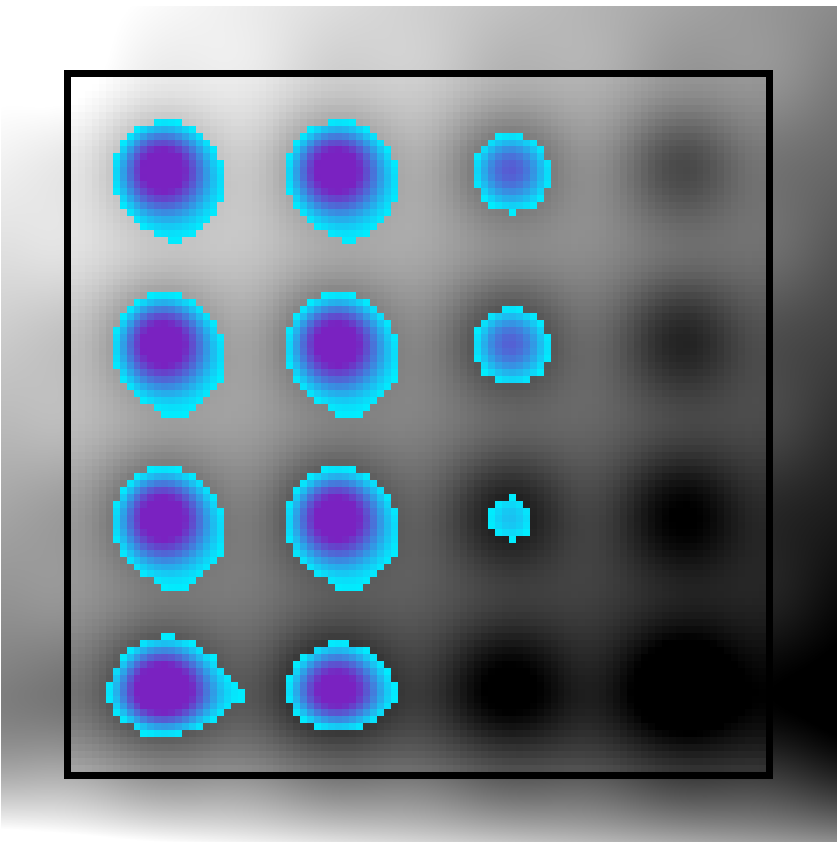
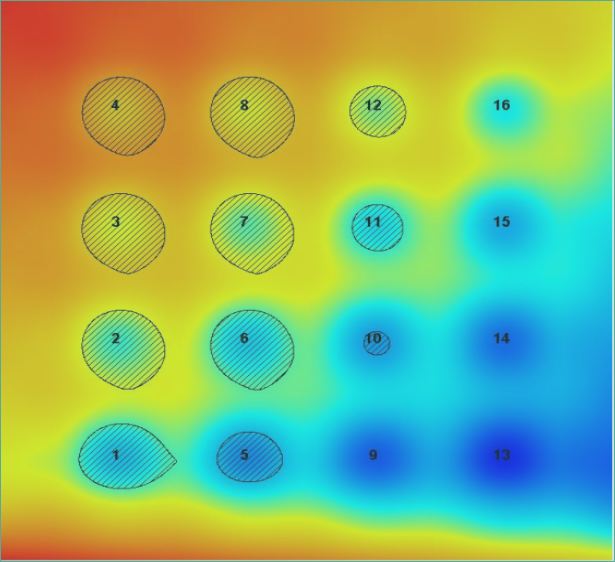
- Final timeframe of water levels as generated by the Tygron Platform (left) and by the other packages (right).
Notes
- Tests were run with a multi-GPU setup. For small cases like this, using single GPU actually leads to faster results. Furthermore, requesting a high number of 576 timeframes further bogs it down. In comparison: 1 GPU with 1 resulting timeframe runs in: 8 s, which is +- 53% faster compared to 2 GPUs with 576 timeframes.
Public test project
A copy of this test project is made available to everyone with access to the Development Server under the name Uk Test 2, providing hands-on insights to those interested. Soon it will appear on the Preview Server as well. In this project the discussed benchmark test is reproduced, though be it with a cropped version of the map (i.e., 2,000 m x 2,000 m), which may result in tiny deviations of the measurements. The special map dimensions mentioned earlier (i.e., 2,040 m x 2,040 m) are not selectable in the Wizard and must be configured through the API.
- The locations of the measurement points are:
| Point ID | X | Y |
|---|---|---|
| 1 | 275 | -1,750 |
| 2 | 275 | -1,265 |
| 3 | 275 | -775 |
| 4 | 275 | -275 |
| 5 | 765 | -1,750 |
| 6 | 765 | -1,265 |
| 7 | 765 | -775 |
| 8 | 765 | -275 |
| Point ID | X | Y |
|---|---|---|
| 9 | 1,255 | -1,750 |
| 10 | 1,255 | -1,265 |
| 11 | 1,255 | -775 |
| 12 | 1,255 | -275 |
| 13 | 1,745 | -1,750 |
| 14 | 1,745 | -1,265 |
| 15 | 1,745 | -775 |
| 16 | 1,745 | -275 |
Note that the coordinate system in this project differs from the one used during the actual benchmark testing as shown in Fig. (b). For the above listed points the center (0,0) is located at the top-left corner instead of the bottom-left, hence will the bottom-right corner have coordinates (2,000;-2,000).
References
- ↑ 1.0 1.1 1.2 Néelz, S., & Pender, G. (2013). Benchmarking the latest generation of 2D hydraulic modelling packages. Report: SC120002. Environment Agency, Horison House, Deanery Road, Bristol, BS1 9AH. ISBN: 978-1-84911-306-9. Retrieved from: https://www.gov.uk/government/publications/benchmarking-the-latest-generation-of-2d-hydraulicflood-modelling-packages
